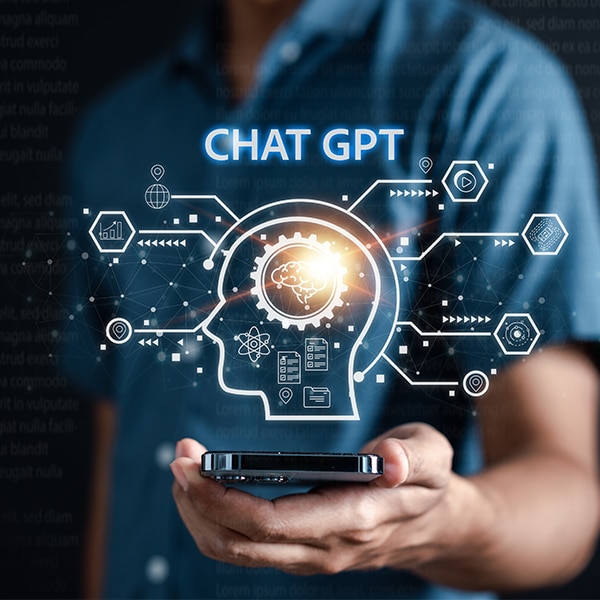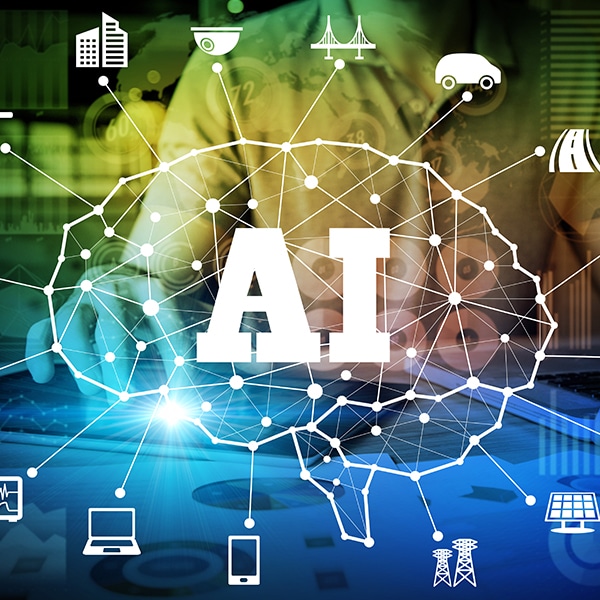Blog
AI and the future of education

Ed Elliott
Head, The Perse School
Read the blog
Headteachers don’t always get the best press, and their depiction in popular fiction can be negative.
The names give it away – The Demon Headmaster leaves little to the imagination, Mr Strickland (Back to the Future), Principal Snyder (Buffy the Vampire Slayer) and Wackford Squeers (Nicholas Nickleby) all have names that reflect their unpleasant natures.
(Please don’t read too much into my reading and watching habits from this list!)
Given the negative connotations that can go with the job, I try to avoid saying exactly what I do when people ask. This also protects me from some of the responses I have received when introduced as ‘Ed, the Perse Head’. These have included ‘you are personally responsible for traffic gridlock on Hills Road’, ‘my grandfather’s father went to The Perse in the 1880s and had a terrible time’ and ‘we should never have been charged for that missing chemistry textbook in Year 8’.
So, nowadays when I’m asked what I do I reply enigmatically that “I make the future better”. This usually prompts some bemused looks before a general assumption sets in that I must work for Microsoft, Google or Tesla.
However, actually making the future better is my core mission. It is the purpose of education. It is why you send your children to The Perse – so that they can receive an excellent education that prepares them well for their future lives.

To prepare pupils for the future, you need to have some idea of what that future might be. As the rate of change speeds up, crystal ball-gazing becomes harder, especially as the pace of change isn’t even.
Whilst we have been talking about artificial intelligence for years, the arrival of ChatGPT has accelerated the adoption of AI in education. If you had asked me this time last year would I be reading very good essays and projects generated by AI, I would have probably said no. However, by March of this year I had read both.
By this time next year ChatGPT may be able to write a better version of this address than me … perhaps it already can? One of you will almost certainly be tempted to check …
As the pace of change accelerates, so does the need to keep up and there is a risk that established educational processes used by the Department for Education, and exam boards will be overtaken by events in cyberspace. Coursework as a method of assessment appears increasingly out of date in a ChatGPT world, whilst the emphasis on learning and retaining knowledge in current GCSE specifications looks positively Victorian in the era of AI-assisted search engines.
One of the longest running debates in education is the ratio of knowledge to skills. In keeping with the times, the first Perse Head, Thomas Lovering, limited a 1618 Perse education to learning the classics and practising a narrow range of academic skills – mostly translating prose. In the 19th Century, the canon of Perse knowledge was extended to include maths, science, French and the humanities, but the skills emphasis remained firmly academic with pupils being assessed on their ability to solve quadratic equations and perform science practicals.
Fast forward to the 21st Century and the World Health Organisation (WHO) has produced a list of 10 core life skills which they recommend all children should acquire so they can live happy, healthy and successful adult lives. The 10 skills in no particular order are:
- Problem-solving
- Critical thinking
- Communication
- Decision-making
- Creative thinking
- Interpersonal relationships
- Self-awareness
- Empathy
- Coping with stress
- Coping with emotions
When employers are asked what skills they are looking for in graduate recruits, they produce a very similar list. It is unsurprising as these are the skills we use all day every day. In contrast, much of the knowledge that government still requires teachers to teach and pupils to learn for public exams rarely gets used in real life. To test this point, I asked 70 Old Perseans at a reunion lunch what colour was potassium permanganate? Immediately a forest of hands shot up. Without exception the OPs all knew the answer – purple.

Perse chemistry teaching in the 1960s and 1970s had clearly been excellent and the knowledge imparted had been well retained. But for what purpose? When I asked the OPs how many of them had used their knowledge of potassium permanganate in their adult lives, the answer was zero. The efficacy of learning very well something that you are unlikely to ever use has to be questioned, especially as in the unlikely event that you need to know about the uses of potassium permanganate, ChatGPT can provide the answers. (… which are as a disinfectant and to preserve bananas in transit).
AI will change the future of education. In a world where AI-assisted search engines can deliver high quality, up-to-date information instantly, there is less need for pupils to memorise knowledge. Likewise, if AI can successfully translate prose and solve quadratic equations, why learn these academic skills?
Much headline-grabbing click bait has been written about how AI could take over the world and cause the extinction of humanity. Such sensationalist articles lack a clearly set-out argument supported by evidence which convincingly shows how Chat GPT leads to Armageddon. However, it is possible to see how a world where human beings are entirely dependent on AI for knowledge and the completion of processes could be a risky place. If you have no subject knowledge and no understanding of process, then how can you know whether the AI-generated answer looks right or not? Human beings have to know enough to be able to know when the AI is hallucinating. They have to know enough to be able to run the machines and not be run by them for AI is excellent at pattern recognition and less good at truth.
My guess is that the curriculum of the future will still be knowledge-based, but the knowledge will be slimmed down. Potassium permanganate may not make the cut. The skills emphasis should broaden, so that alongside the academic skills of essay writing, trigonometry and dissection, there will be a greater focus on the WHO core life skills such as creativity, communication and empathy.
One hugely important life skill is emotional intelligence. EI is the key to understanding body language, voice intonation and other non-verbal clues so we get a better understanding of what people are really thinking and feeling.

EI helps us to get the best out of pupils by knowing how to approach individuals so that we press the right metaphoric buttons. EI is vital for happy and durable relationships which require flex, understanding and empathy. EI is the cement that binds couples, families, work colleagues and friends together. It lubricates relationships, reduces friction, improves morale and raises productivity. This essential life skill is acquired informally as children play with one another, but in a digital world where there are less face-to-face interactions, it may need to be supplemented by EI skills lessons in schools.
There is much wisdom in 1980s popular music lyrics. So in true PopMaster mode I give you:
“It ain’t what you do, it’s the way that you do it, and that’s what gets results.”
The words, of course, are from Bananarama and Fun Boy Three, recycled as is often the case with wisdom – from an earlier song by Ella Fitzgerald.
Two teachers can deliver an identical lesson plan, with identical resources, to classes of equivalent ability, housed in similar rooms. Yet one class can have a more positive learning experience and make more progress than the other.
This is because of the EI effect. The non-verbal behaviours of one teacher can have a more positive effect on the class and their learning than the non-verbal behaviours of the other teacher. It may just be a case of smiling more, of making encouraging hand gestures, or of having a David Attenborough-style voice that mixes soft spoken enthusiasm with calm reassurance and authority. The best teachers have an aura of caring about them – care for their pupils and care for their subject and because the teachers care, so do the pupils, for themselves and their progress. Teaching isn’t transactional, it is relational and the more positive the relationship between teacher and student, the better the learning and behaviour outcomes.

This is why teachers won’t be replaced by AI bots any time soon. For it takes a human, with considerable EI, to get the best out of another human by inspiring, caring, encouraging, empathising and enthusing. AI may actually help teachers in this respect because if AI can speed up the creation of lesson plans and learning resources, it may leave teachers with more time to support pupils on a 1:1 relational basis.
Not all fictional heads are bad, and I will end with a few words from a good fictional role model – Albus Dumbledore.
In an occasion when we rightly celebrate achievement we should also remember that “it is our choices that show what we truly are, far more than our abilities”.
So, in preparing pupils for the fast approaching future we must also give them all a moral compass, a means to distinguish right from wrong and to live decent, good lives. As Dumbledore recognised, we all have to make the choice between what is right and what is easy. Some choices can be very hard – when to side with friends and when to call out poor behaviour, when to protect oneself and when to help others, when to be decisive and when to delay, when to be tough and when to show compassion.
Such decisions require an abundance of reason, reflection, EI, balance, morality, bravery, compassion and common sense. Getting them right is probably the hardest life skill of all. These are human decisions that should not be delegated to AI and schools need to equip children with the knowledge, skills and qualities required to make the right calls.
The blog was originally published on the school’s website, here, on the 6th July 2023.


